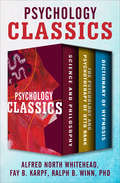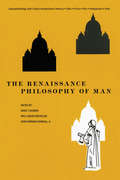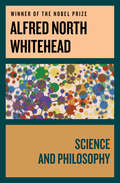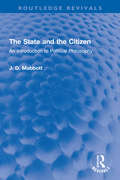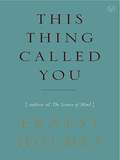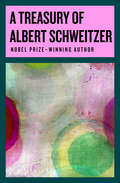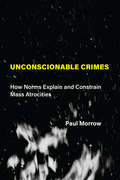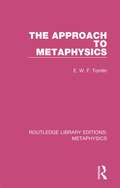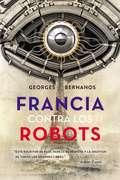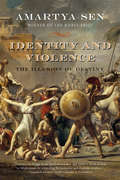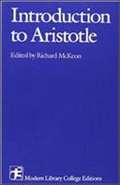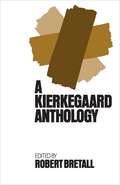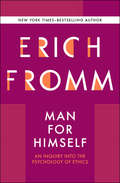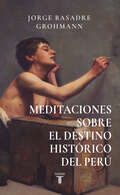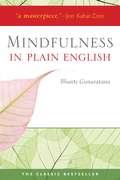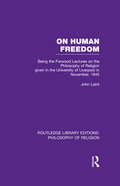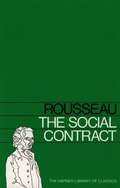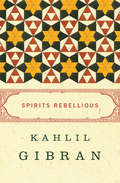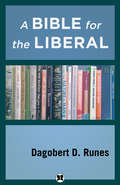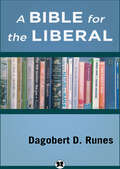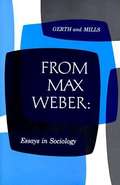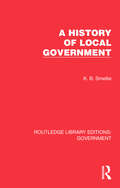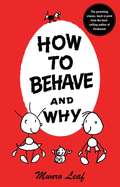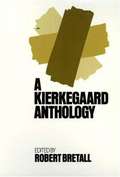- Table View
- List View
Psychology Classics: Science and Philosophy, The Psychology and Psychotherapy of Otto Rank, and Dictionary of Hypnosis
by Alfred North Whitehead Fay B. Karpf Ralph B. WinnThree classic texts in one: essays by Alfred North Whitehead, an authoritative study of Otto Rank, and an essential reference book on hypnosis. In Science and Philosophy, Alfred North Whitehead presents his mature thought on topics ranging from education to science and mathematics; from the theories of John Dewey to Albert Einstein. These collected essays cover his positions in a deep and extraordinarily unified way. Austrian psychologist Otto Rank is one of the most influential figures of modern psychotherapy. A protégé́ of Sigmund Freud, he made significant developments in the fields of analysis, psychotherapy, counseling, education, and social work. In The Psychology and Psychotherapy of Otto Rank, social psychologist Fay B. Karpf—who studied with Rank—presents an authoritative analysis of his pioneering work and legacy.Dictionary of Hypnosis has been an essential text on the subject since its first publication in 1965. Written by psychology professor Dr. Ralph B. Winn, this wide-ranging reference book provides a substantial amount of information on the history of hypnosis and its various uses in contemporary medicine, psychology and other sciences.
The Renaissance Philosophy of Man
by Ernst Cassirer Paul Oskar Kristeller John Herman Randall Jr.Despite our admiration for Renaissance achievement in the arts and sciences, in literature and classical learning, the rich and diversified philosophical thought of the period remains largely unknown. This volume illuminates three major currents of thought dominant in the earlier Italian Renaissance: classical humanism (Petrarch and Valla), Platonism (Ficino and Pico), and Aristotelianism (Pomponazzi). A short and elegant work of the Spaniard Vives is included to exhibit the diffusion of the ideas of humanism and Platonism outside Italy. Now made easily accessible, these texts recover for the English reader a significant facet of Renaissance learning.
Science and Philosophy
by Alfred North WhiteheadFrom a discussion of Einstein&’s theories to an analysis of meaning, the philosopher offers a fascinating collection of essays on a wide range of topics. This is a collection of many of Whitehead&’s papers that are scattered elsewhere. It was the penultimate book he published, and represents his mature thoughts on many topics. Philosophical Library has done a great service by publishing a representative collection of his writings on the subjects of Philosophy, Education and Science. The portion on Philosophy includes five papers: &“Immortality&”, &“Mathematics and the Good&”, &“Process and Reality&”, &“John Dewey and His Influence&” and the &“Analysis of Meaning.&” The first three chapters consist of Whitehead&’s personal reflections illumined by flashes of his lively humor. They are picturesque and amusing. The remainder of the book consists of chapters on Philosophy, Education, and Science. They cover in depth his positions on many scientific and philosophical matters in an extraordinarily unified way. The final section of the book is devoted to excellent surveys of Geometry and Mathematics as well as a paper on Einstein&’s theories.
Science and Philosophy: Science And Philosophy, The Preservation Of Youth, And Understanding History (Paperback Ser.)
by Alfred North WhiteheadFrom a discussion of Einstein&’s theories to an analysis of meaning, the philosopher offers a fascinating collection of essays on a wide range of topics. This is a collection of many of Whitehead&’s papers that are scattered elsewhere. It was the penultimate book he published, and represents his mature thoughts on many topics. Philosophical Library has done a great service by publishing a representative collection of his writings on the subjects of Philosophy, Education and Science. The portion on Philosophy includes five papers: &“Immortality&”, &“Mathematics and the Good&”, &“Process and Reality&”, &“John Dewey and His Influence&” and the &“Analysis of Meaning.&” The first three chapters consist of Whitehead&’s personal reflections illumined by flashes of his lively humor. They are picturesque and amusing. The remainder of the book consists of chapters on Philosophy, Education, and Science. They cover in depth his positions on many scientific and philosophical matters in an extraordinarily unified way. The final section of the book is devoted to excellent surveys of Geometry and Mathematics as well as a paper on Einstein&’s theories.
The State and the Citizen: An Introduction to Political Philosophy (Routledge Revivals)
by J. D. MabbottFirst published in 1948, The State and the Citizen traces the development of the idea of the State as the ultimate source of authority. The author then proceeds to suggest the proper ends and limitation of State action. He analyses the conceptions of State unity and corporate loyalty and ends with a discussion on the relations between States and other associations, and between one State and another. This short and lucid introduction to political philosophy is an essential read for students and scholars of political philosophy, philosophy, and political studies.
This Thing Called You (New Thought Library)
by Ernest HolmesThe inspiration of Ernest Holmes has reached hundreds of thousands of readers through his classic works, many of which are just now becoming available in paperback. Originally published in the first half of the twentieth century, these meditative, concise volumes have never previously appeared in paperback. Whether a newcomer to the philosophy Holmes founded or a veteran reader, you will find great power and practicality in the words that render Holmes one of the most celebrated and beloved mystical teachers of the past hundred years. .
A Treasury of Albert Schweitzer
by Albert SchweitzerCollected here in a single volume are the most important philosophical writings of Albert Schweitzer, one of the greatest thinkers and humanitarians of our time. Carefully chosen from among his many written works, the selections in this anthology illuminate and amplify Dr. Schweitzer&’s cardinal principle of belief—a reverence for life. Among the important and revealing works included are &“Pilgrimage to Humanity,&” which outlines his philosophy of culture, the early influences in his life, and his ideal of world peace; &“The Light Within Us,&” one of the twentieth century&’s most significant and beautiful statements of one man&’s faith in his fellow man; and &“Reverence for Life,&” which states, with great clarity and conviction, the essence of Schweitzer&’s wisdom. Because of his legendary fame as a medical missionary, other equally important and outstanding aspects of Schweitzer&’s life are not as well known. Readers of this book will realize that Albert Schweitzer was a truly creative thinker, whose concern with the problems of the human spirit and whose methods of expressing this concern have raised him to the stature of one of the world&’s foremost philosophers.
Unconscionable Crimes: How Norms Explain and Constrain Mass Atrocities
by Paul C. MorrowThe first general theory of the influence of norms--moral, legal and social--on genocide and mass atrocity.How can we explain--and prevent--such large-scale atrocities as the Holocaust? In Unconscionable Crimes, Paul Morrow presents the first general theory of the influence of norms--moral, legal and social--on genocide and mass atrocity. After offering a clear overview of norms and norm transformation, rooted in recent work in moral and political philosophy, Morrow examines numerous twentieth-century cases of mass atrocity, drawing on documentary and testimonial sources to illustrate the influence of norms before, during, and after such crimes.
The Approach to Metaphysics (Routledge Library Editions: Metaphysics)
by E. W. TomlinOriginally published in 1947. This book looks at contemporary conundrums in philosophical tendencies, bringing the reader a first-principles review of the purpose of such enquiries in relation to modern life. It presents the importance of the history of the development of philosophical thought, beginning in Part 1 with perception. Significant definitions and theories are identified and later refinements discussed – in particular conceptualism and its development from the Greeks through Berkeley to modern realism and its limitations and critiques. Part 2 brings problems identified by past thinkersto the fore, from Plato’s forms to Christian theology, in an examination of the apparent dichotomy between metaphysics and scientific methods. Part 3 examines the Rationalist and the Empiricist attacks on Scepticism and Kant’s reconciliation of the differences of both. This provides the context and structure for discussion of the works of Hegel, and ultimate refutation thereof as a confusion between metaphysics and theology. Part 4 identifies the developments in thinking of Positivism, both Modern and Logical, and the New Synthesis of Alexander and Whitehead as the most recent approach.
Francia contra los robots
by Georges BernanosEn 1948, el reconocido escritor de inspiración mística Georges Bernanos desapareció, dejando el manuscrito de un último libro, publicado póstumamente: Francia contra robots. Esta apasionada defensa de la libertad es un desafío a las idolatrías paganas de ganancia y fuerza, con una increíble actualidad. Esta diatriba contra la "sociedad de las máquinas" es un grito futurista, para señalar una sociedad en la que es posible llevar una vida digna de seres humanos.Esta visionaria obra señala una Sociedad futura donde la tecnología domina a los seres humanos y los deshumaniza. Atacando la conformidad burguesa en nombre de sus creencias católicas, el autor afirma "que no es ni de izquierda ni derecha" y los conflictos internos son especialmente la fuente de las maldades que disminuyen al hombre y todas las tiranías que lo aplastan.“El peligro no está en las máquinas, de lo contrario deberíamos hacer este sueño absurdo de destruirlas por la fuerza, a la manicura de los iconoclastas que, rompiendo las imágenes, se halagaron aniquilando también las creencias. El peligro no está en la multiplicación de máquinas, sino también en el número cada vez mayor de hombres, que desde su infancia, solo desean lo que las máquinas pueden proveer”.
Identity and Violence: The Illusion of Destiny (Issues of Our Time)
by Amartya Sen"One of the few world intellectuals on whom we may rely to make sense out of our existential confusion."--Nadine Gordimer In this sweeping philosophical work, Amartya Sen proposes that the murderous violence that has riven our society is driven as much by confusion as by inescapable hatred. Challenging the reductionist division of people by race, religion, and class, Sen presents an inspiring vision of a world that can be made to move toward peace as firmly as it has spiraled in recent years toward brutality and war.
Introduction to Aristotle
by Aristotle Richard P. MckeonThis Introduction to Aristotle is a presentation in which Aristotle is permitted to speak for himself in the context of a sketched scheme of the relation of what he says in one treatise to what he says elsewhere. The seven introductions which precede these seven works place them in their contexts by describing their relations to other works or parts of works, their place in the scheme of the Aristotelian sciences, and the fashion in which the subjects treated in the sciences they expound may be considered in the approaches proper to other sciences in the system.
Kierkegaard Anthology
by Robert BretallThis anthology covers the whole of Kierkegaard's literary career. The selections range from the terse epigrams of the Journal through the famous "Diary of the Seducer" and the "Banquet" scene, in which Søren Kierkegaard reveals his great lyric and dramatic gifts, on to the philosophical and psychological works of his maturity. These are climaxed by the beautiful and moving religious discourses which accompany them; finally, there is the biting satire of his Attack upon "Christendom."This is emphatically not a collection of "snippets," but the cream of Kierkegaard, each selection interesting and intelligible in itself, and all ranking among his most important work. They are so arranged as to convey an idea of his remarkable intellectual development.Contents: A comprehensive anthology from the following works: Either/Or Fear and Trembling Stages on Life's Way Works of Love Concluding Unscientific Postscript Attack upon "Christendom" The Sickness Unto Death Philosophical Fragments and other?
Man for Himself: An Inquiry Into the Psychology of Ethics (Routledge Classics Ser.)
by Erich Fromm&“There is no meaning to life except the meaning man gives his life by the unfolding of his powers.&” —Erich FrommAre we primarily determined by nature or nurture? What are the best ways that people can live productively? In Man for Himself, renowned social philosopher Erich Fromm posits: With the gifts of self-consciousness and imagination, any individual can give his or her own unique answer. This answer is rooted in our human nature, and should correspond to mankind&’s powers of reason and love. Therefore, Fromm reasons, &“living itself is an art.&” In his humanistic concept of man, Fromm describes various character orientations that are to be found in Western culture. For the first time, Fromm analyzes the parallels between economic concepts of market value and how we value others and ourselves—the idea of personality as a commodity. He argues for a return to humanistic ethics, and discusses issues such as the question of conscience, of selfishness and self-love, and of pleasure and happiness. This ebook features an illustrated biography of Erich Fromm including rare images and never-before-seen documents from the author&’s estate.
Meditaciones sobre el destino histórico del Perú
by Jorge Basadre GrohmannEL MÁS IMPORTANTE PENSADOR DEL SIGLO XX EN UNA BÚSQUEDA INTELIGENTE Y EMOTIVA DE LA RAZÓN HISTÓRICA DEL PERÚ Pieza representativa de la monumental obra de Jorge Basadre Grohmann, este volumen de artículos y ensayos, aparecidos en diarios y revistas del país y el extranjero, es uno de los mejores esfuerzos intelectuales del siglo pasado por comprender, interpretar y definir la esencia del desarrollo histórico del Perú.Entre sus páginas el autor ejerce un llamado para la conformación de "una conciencia de la patria y de la integración nacional". Lo hace procurando dirigir su discurso al ciudadano, en especial a los educadores y las nuevas generaciones, en quienes cifra el destino de la nación. A ambos los conmina a pensar el Perú como una continuidad que atraviesa las épocas y los periodos y se proyecta generoso siempre hacia el futuro, lejos de los compartimentos estancos propios del sistema educativo, así como del "eruditismo infértil" y de las luchas fratricidas. En suma, una apuesta por el sí, por la promesa democrática, por la integración del territorio y sus habitantes, incluso a pesar de "la barata retórica electoral" y los reveses del siglo XIX. Meditaciones sobre el destino histórico del Perú es un conjunto de textos de esmerado rigor pedagógico y filosófico, en el que abunda la lucidez y el optimismo. De allí que este libro resulte insoslayable para entender, aún hoy, por qué debemos buscar el bien común por encima de nuestras diferencias políticas, sociales y culturales. «… estas Meditaciones son el sustento de la obra de Basadre, los planos de la catedral. Aquí están sus motivaciones y esperanzas, sus juicios más generales, las leyes y axiomas del sistema basadriano». Alberto Vergara
Mindfulness in Plain English
by Bhante Henepola GunaratanaWith over a quarter of a million copies sold, Mindfulness in Plain English is one of the most influential books in the burgeoning field of mindfulness and a timeless classic introduction to meditation. This is a book that people read, love, and share - a book that people talk about, write about, reflect on, and return to over and over again. Bhante Gunaratana is also the author of Eight Mindful Steps to Happiness, Beyond Mindfulness in Plain English, The Four Foundations of Mindfulness in Plain English, and his memoir Journey to Mindfulness.
On Human Freedom: Being the Forwood Lectures on the Philosophy of Religion given in the University of Liverpool in November, 1945 (Routledge Library Editions: Philosophy of Religion)
by John LairdIn the author’s opinion there are three primary conceptions of human freedom - non-coercion, autonomy and indeterminism. He presents his thoughts to define, compare, distinguish and correlate these, not merely with regard to the freedom of the human will, but also and more generally with regard to freedom in human life and thought. The discussion is psychological, ethical and theological. Originally published in 1947.
Social Contract: & Discourses
by Jean Jacques RousseauWise men, if they try to speak their language to the common herd instead of its own, cannot possibly make themselves understood. There are a thousand kinds of ideas which it is impossible to translate into popular language. Conceptions that are too general and objects that are too remote are equally out of its range: each individual, having no taste for any other plan of government than that which suits his particular interest, finds it difficult to realize the advantages he might hope to draw from the continual privations good laws impose. -from VII: "The Legislator" How does human nature impact politics and government? What is the "social contract," and what are our obligations to it? Is the "general will" infallible? What are the limits of sovereign power? What are the marks of "good government"? What constitutes the death of the body politic? How can we check the usurpations of government? Swiss philosopher JEAN-JACQUES ROUSSEAU (1712-1778) was a dramatic influence on the French revolution, 19th-century communism, the American Founding Fathers, and much modern political thought, primarily through this 1762 work, his most influential. Here, he explores concepts of civil society, human sovereignty, and effective government that continue to be debated-and not yet settled-in the 21st century. A classic of modern thought, this is required reading for anyone wishing to be considered well educated.
Spirits Rebellious: Large Print
by Kahlil GibranA clarion call for freedom from one of the twentieth century&’s most important philosophers and writers, Kahlil Gibran A book so powerful it was burned in the marketplace of Beirut at the time of its publication, Kahlil Gibran&’s Spirits Rebellious is a clarion call for freedom in his homeland of Lebanon—for individuals and society. Gibran&’s bitter denunciation of religious and political injustice flows through his lyric pen in three parables, that of &“Madame Rose Hanie,&” &“The Cry of the Graves,&” and &“Kahlil the Heretic.&” His vision of liberty is no less powerful today.
A Bible for the Liberal
by Dagobert D. RunesThis Bible is not a new book. It is, rather, a selection of the principles of ethics, taken from all biblical literature, including the HebrewBooks of Wisdom and TheApocrypha, without the usual mythological and ritualistic framework. Liberals of our time will find in this selection the essence of true Judaism and Christianity. The purpose of this anthology is to help those with critical, with even prejudicial eyes, to get a view of the majestic panorama that unfolds in the writings of the great Hebrew and Christian Men of God. The believer, as well as the non-believer, will be able to find in this book the essential ethics of the great law-givers and prophets of biblical times.
A Bible for the Liberal
by Dagobert D. RunesThe ethical teachings of Judaism and Christianity are presented in distilled form in this concise volume of Biblical writings. A Bible for the Liberal is not a new book. It is, rather, a selection of the principles of ethics, taken from all biblical literature, including the Hebrew Books of Wisdom and The Apocrypha, without the usual mythological and ritualistic framework. In these selections, philosopher Dagobert D. Runes presents what he calls &“the essence of true Judaism and Christianity.&” The believer, as well as the non-believer, will be able to find in this book the essential ethics of the great law-givers and prophets of biblical times.
From Max Weber: Essays in Sociology
by Max Weber Hans H. Gerth C. Wright MillsAn introduction to the work of the greatest German sociologist and a key figure in the development of present-day sociological thought.
A History of Local Government (Routledge Library Editions: Government)
by K. B. SmellieOriginally published in 1946, this book traces the essential changes in structure, areas and in the relations between local and central authorities in England from 1832 to the Education Act of 1944. Modern English local government has developed from the industrial and scientific revolution and the growth of political democracy since 1832 and the present system is the result of an interplay between political, economic and scientific factors. The book contains a stand-alone chapter on London government and an introductory chapter on the condition of local government between 1689 and 1832.
How to Behave and Why
by Munro LeafHave you ever uncovered a hidden treasure of a book while browsing in some forgotten corner of a bookstore? I happened across How to Behave and Why in this fashion. Initially I was delighted by its bold red-and-black cover design, so simple and yet so arresting, and its charming stick-figure illustrations. It wasn't until I had read the book that I discovered its most enchanting feature: This book doesn't teach the most recent or fashionable etiquette of the day; it encourages a spirit of cooperation among people and a humanity that applies to societies the world over. This lesson is classic and timeless. I hope How to Behave and Why enchants you as it enchants me.
A Kierkegaard Anthology
by Robert Bretall Søren KierkegaardThis anthology covers the whole of Kierkegaard's literary career. The selections range from the terse epigrams of the Journal through the famous "Diary of the Seducer" and the "Banquet" scene, in which Søren Kierkegaard reveals his great lyric and dramatic gifts, on to the philosophical and psychological works of his maturity. These are climaxed by the beautiful and moving religious discourses which accompany them; finally, there is the biting satire of his Attack upon "Christendom. " This is emphatically not a collection of "snippets," but the cream of Kierkegaard, each selection interesting and intelligible in itself, and all ranking among his most important work. They are so arranged as to convey an idea of his remarkable intellectual development.
